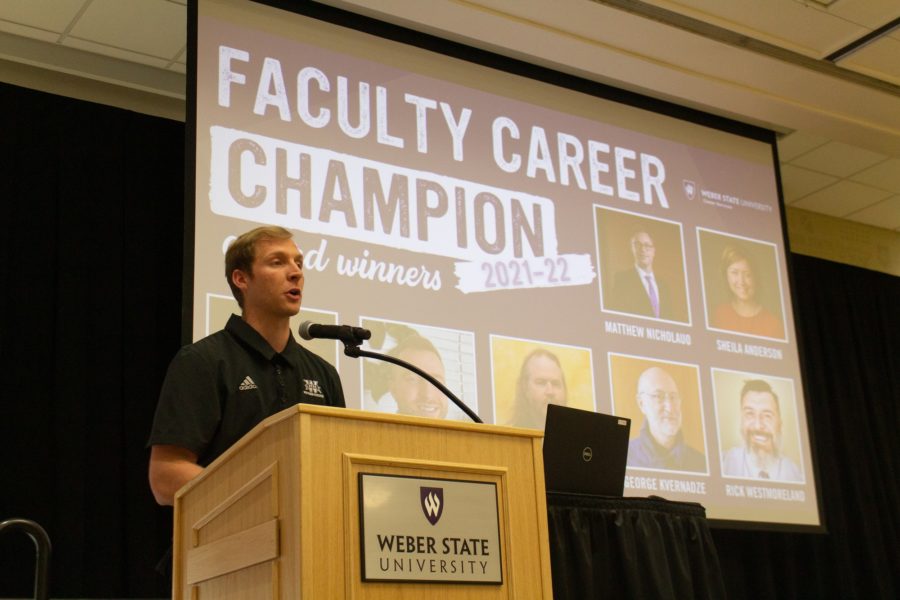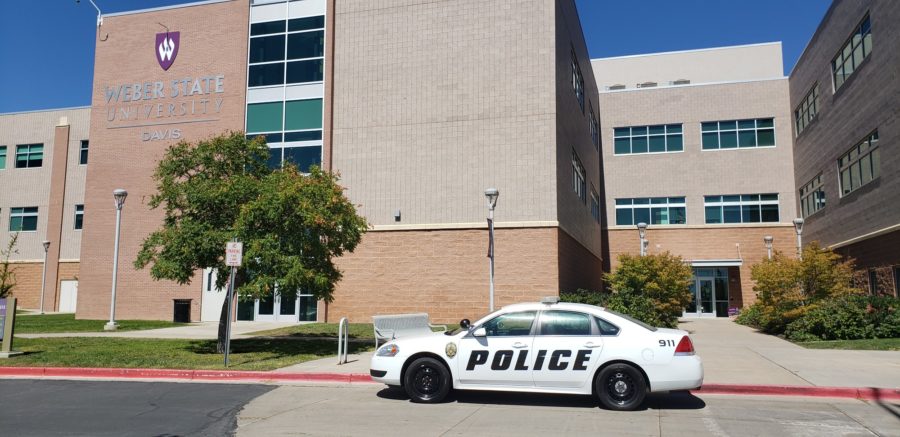PETA and Weber State University’s Animal Unanimity group hosted Glass Walls this week, an event that put students in an

animal’s perspective inside slaughterhouses and factory farms. The event was named for the film Glass Walls, which was screened for students at the event.
“It basically consists of an enormous inflatable tent, inside of which people can see how animal meat industries work,” said Ryan Huling, manager of college campaigns and outreach at PETA. “There’s also a 120-inch projector screen, which will broadcast our high-def version of Glass Walls.”
The movie, narrated by former Beatles member Sir Paul McCartney, is an undercover investigation into slaughterhouses and factory farms that highlights some of the poor conditions animals are in before they are turned into fast-food burgers. The movie got its title, according to a video on PETA’s website, from the idea that “if slaughterhouses had glass walls, everyone would be vegetarian.”
“Honestly, most people don’t really see this, and the industry depends on that,” said WSU student and Animal Unanimity member Michael Brown. “Knowing facts about how the animals are treated definitely turns people away from those industries.”
WSU sophomore Aimee Ball has been vegan for eight months.
“It’s just they’re living, breathing things,” said Ball of her reason to switch to a vegan diet. “We’re not killing people because we think they might taste good, so why kill animals?”
Ball isn’t the only one to go vegan while in college. According to recent studies, students across the country are jumping on board the vegetarian/vegan train, and fast. According to a study by the group Bon Appetit, the number of vegetarian and vegan college students has dramatically increased. The number of vegetarian college students has jumped 50 percent since 2005, and the number of vegan students has already doubled.
Huling said this is a very dramatic increase in a small amount of time.
“While I was a college student, I was horrified to learn that cow’s throats are slit while they’re still alive,” Huling said. “Chickens are boiled alive before they become chicken nuggets. Thanks to great vegan options out there, there’s now delicious ways to not support these slaughterhouses.”
Students who attended this event were able to sample some of those options, which Huling and the PETA organization hope will “put them on a more passionate track.” Along with watching the documentary, students could go through a maze, which highlighted some of the main focuses of PETA and why some people choose to go vegan.
Brown went vegetarian when he was 10, after seeing the conditions chickens are put in on a field trip. He decided to go vegan after watching a documentary similar to Glass Walls on the milk and egg industries.
“Once milk produce is at a low, they kill the cows,” Brown said. “They put the chickens in tiny cages, and once they are done laying eggs, they kill them. I was vegetarian at the time, but I still felt like I was contributing to the mess.”
These documentaries show a side of eating meat that most people might not like to think about: what happens to the animals before they become food. This becomes PETA’s greatest weapon in fighting the meat industries.
However, these documentaries are in danger of becoming illegal. Utah recently became the second state to pass an “ad-gag” law, which imposes criminal punishment on anyone taking photos or making videos inside factory farms without permission. Gov. Gary Herbert signed the bill into law earlier this year. The basis of the law states these documentaries and photos are damaging to companies’ financial interests and credibility.
“This violates free speech and violates our right to know what is really going on,” Brown said. “It creates a blind culture. When people don’t see it happening, they don’t think about it. . . . Pretty soon they’ll start making it illegal to show these films and photographs.”
Animal Unanimity and PETA took full advantage of their right to show these videos and photos on WSU’s campus earlier this week in an attempt to show students that veganism is not a scary diet and is actually quite affordable for college students.
According to Huling, “only when you look at Whole Foods does it get expensive . . . and you won’t be paying for your health later.”
Veganism has become a way of life to more than 3 million PETA supporters and members, including several at WSU.
“It was pretty easy for me to switch,” Ball said. “The hardest (part) is that you have to be careful and serious when you’re looking at nutrient labels. . . . There are a lot of names for animal byproducts I didn’t know about. . . . It’s a good decision to go vegan, but you have to think about your body, too. Make sure you’re getting all the nutrients your body needs.”



















